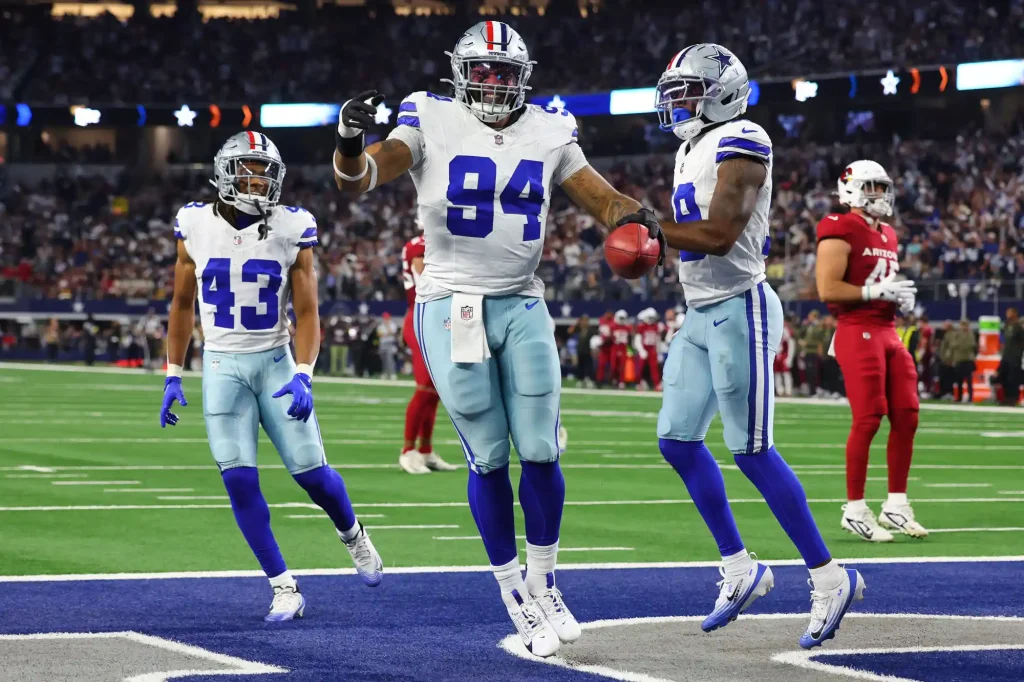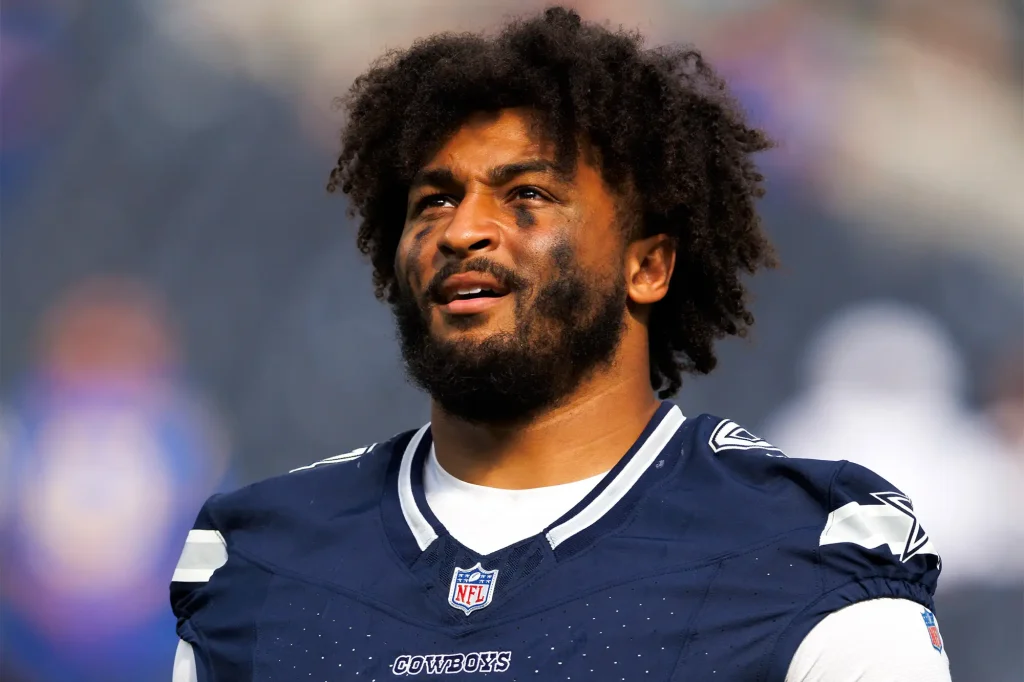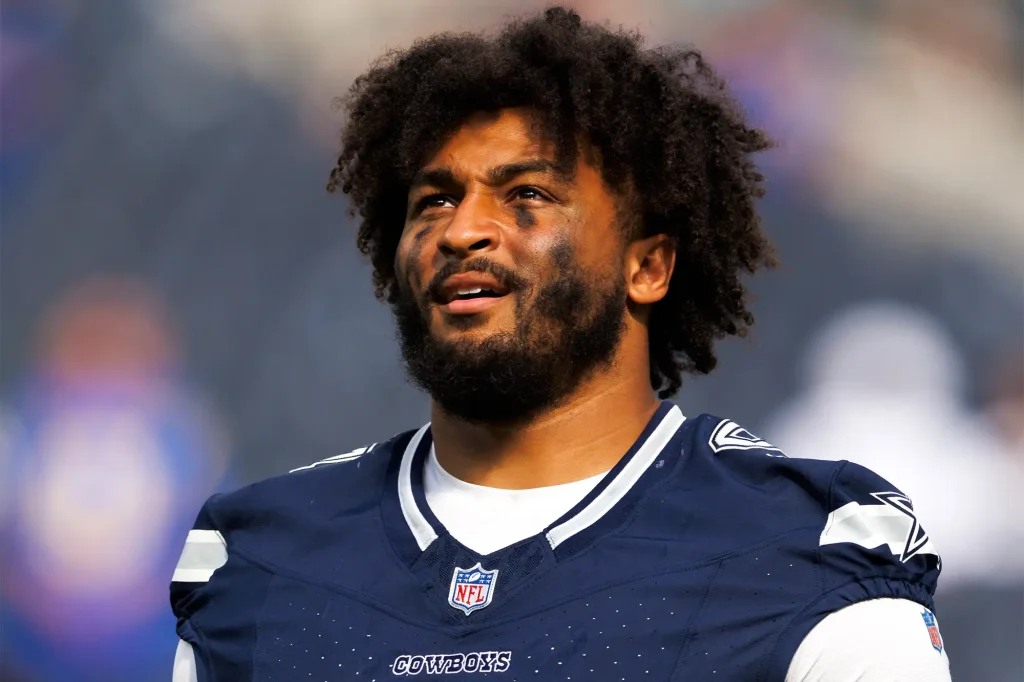Dallas Cowboys Defensive End Marshawn Kneeland’s Last Hours: Police Chase, Goodbye Texts and a Rise from Grief Before His Sudden Death
In the early hours of Thursday, November 6, 2025, a deep silence settled over the training complex of the Dallas Cowboys — a silence full of questions, grief and the sudden, harsh end to a young life of promise. Forty-eight hours earlier, defensive end Marshawn Kneeland, just 24, had scored the first touchdown of his NFL career and seemed on the verge of breaking through. Then late Wednesday night, a chain of events led to his car being pursued by Texas state troopers for a traffic violation, dispatchers receiving frantic text messages from him and his girlfriend, a crash in Frisco, and ultimately the discovery of his body under circumstances authorities say point to an apparent suicide.

The events began around 10:30 p.m. on November 5 when the Texas Department of Public Safety attempted to pull over Kneeland for a traffic violation on the Dallas North Tollway. He did not stop; troopers commenced a pursuit that ended when the vehicle was found crashed on the Dallas Parkway in Frisco. Kneeland fled on foot and was located at approximately 1:31 a.m., at a site near the crash, suffering from a self-inflicted gunshot wound, according to official public-safety dispatch recordings and statements.
Earlier that night, officers had responded to a welfare concern call at Kneeland’s residence in Plano, Texas, at about 11:40 p.m. But no one answered the door and the residence remained silent. Minutes later, dispatchers received alerts that Kneeland had sent a group text to friends that appeared to read “goodbye.” His girlfriend then contacted police, saying he was armed, suffering from mental-health issues and had stated he “would end it all.” The call, later confirmed through dispatch audio, revealed just how acute his distress had been.
Just days earlier, on Monday night, Kneeland had celebrated a career high. He recovered a blocked punt in the end zone and scored the first touchdown of his NFL career during a November 3 game against the Arizona Cardinals. Many around the team thought this might launch him into a breakout season. Instead, the night to follow turned tragic.
Kneeland’s path to the NFL was one marked by dedication and heartbreak alike. Born July 8, 2001, in Grand Rapids, Michigan, he attended Godwin Heights High School and later starred at Western Michigan University where he became a second-team All-MAC selection in 2023. He was selected by the Cowboys in the second round of the 2024 NFL Draft, a pick that carried hopes for his emergence as a defensive difference-maker.

Behind the scoreboard stats, however, there was a young man carrying deep emotional burdens. In February 2024, Kneeland’s mother died unexpectedly. He later revealed he had carried her ashes in a necklace he wore on the field, a tangible reminder of both his grief and his mission.
On the night of his death, what unfolded for those who knew him was heartbreak in motion. At approximately 1:30 a.m. in a suburban Frisco search zone, drones and K-9 units were deployed after the car had been abandoned and a perimeter set around wooded areas near the Dallas Parkway. Sources say the officers had been advised of a text message that warned he might be armed. The subsequent discovery of his body turned the search into sorrow.
The Cowboys organization confirmed the news in the early morning hours of November 6. In a statement, the team said: “It is with extreme sadness that the Dallas Cowboys share that Marshawn Kneeland tragically passed away this morning. Marshawn was a beloved teammate and member of our organization. Our thoughts and prayers are with his girlfriend Catalina and his family.”
Within the locker room and across the league, there was stunned silence, and a palpable sense of disbelief. Teammates, coaches and fans alike are grieving the loss of talent cut suddenly short. Defensive lineman Solomon Thomas, a teammate and mental-health advocate, posted emotional words on social media: “Brother Marshawn, I love you… We will lift your spirit up every day.” Thomas, who lost his own sister to suicide, called for the NFL to redouble its focus on emotional wellness.
Mental-health professionals note that sudden deaths of young athletes often reflect a complex interplay of pressures, identity, and trauma — even when the outward success appears clear. The tragedy of Kneeland shows how a single brilliant moment — the touchdown, the high-energy play, the draft-selection lift — can obscure inner turmoil. The fact that his career high preceded his death by mere days underscores the urgency of ongoing mental-health support in sport.
The Cowboys have confirmed they are working with Kneeland’s family to help draft a meaningful tribute in his honor. At the team facility, his locker was transformed into a memorial: flowers, notes and photos of him smiling in his Cowboys jersey. As one staff counselor said, “We are all grappling with it; he was a young man with unlimited potential and still so much ahead of him.”
For his family, the loss is crushing. In a joint statement the Kneeland family wrote: “We are devastated by this tremendous loss and are still processing the depth of our grief. As Marshawn was making his mark on the football field with the Dallas Cowboys, he held an even more special place off the field — as a devoted son, brother, uncle, cousin, nephew, grandson, and friend. He was kind, determined, humble and full of love. His light shone brightly in every life he touched.”
While investigations into the precise cause and timeline remain under the authority of the Collin County Medical Examiner, who will determine the final findings, the publicly captured sequence of events — the chase, the crash, the text messages, the welfare call — provide a sobering look into his final night. Analysts say this is not about blame but about how spirals of loneliness and distress can rapidly pass from private to public.
Kneeland’s loss resonates beyond the Cowboys organization or the NFL. It is a tragic reminder of a rising athlete’s passage from high-school hopeful to professional promise and how, in between the cheers and lights, the human behind the helmet can be silently struggling. As football moves forward, the broader question remains: how will the sport ensure that the young men playing at its highest level have not just physical support, but emotional rescue lines and lifelong connection?
As the Dallas Cowboys and the NFL community mourn, they also confront the stark reality that talent, fame and hope do not shield from mental-health challenges. And so, the story of Marshawn Kneeland turns into more than a loss of a promising defensive lineman; it becomes a mirror for athletes everywhere, a call for vulnerability amid performance, and a reminder that even in stadium lights, some players carry shadows.
At 24, Kneeland’s life ended too soon. But the echoes of his pursuit — of the game he loved, of the dreams he chased, of the young man determined to rise through adversity — still travel. It is now up to his family, teammates, and the sport itself to ensure his legacy is not only remembered, but used to foster change, connection and compassion.


